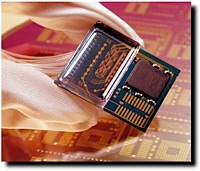Applications of electronically programmable microfluidic technology are being pursued by RUB-BioMIP in connection with a startup company Protostream GmbH that became affiliated with the PACE project in 2007.
A key step in Protostream’s strategy is making use of the core technology of directed synthetic evolution, to be integrated in our chemical microprocessors. This includes both electronic control and molecular evolution. The most promising route to directed evolution is via programmable reconfigurable systems involving chemical components. Our systems will utilize evolved programmable components for integrated chemical process management including evolved self-assembling structures for molecular-scale handling. While such components have evolved for every multi-cellular organism, there they are too sensitive and ephemeral for routine industrial use.
Information-intensive chemical processing requires systems to take dynamic microscopic control of their boundaries and the transport of material across them: forming cell-like “smart containers”. This detailed control will be facilitated by the self-assembling properties of molecules, forming multiphase systems, but directed by electronic field gradients. Protostream will make this possible on the micro-and nanoscale and, together with other partners from research and industry, it will provide a core technology for future artificial nanoscale cells (“nanocells”). Nanocells represent one endpoint of autonomous chemical technology.



